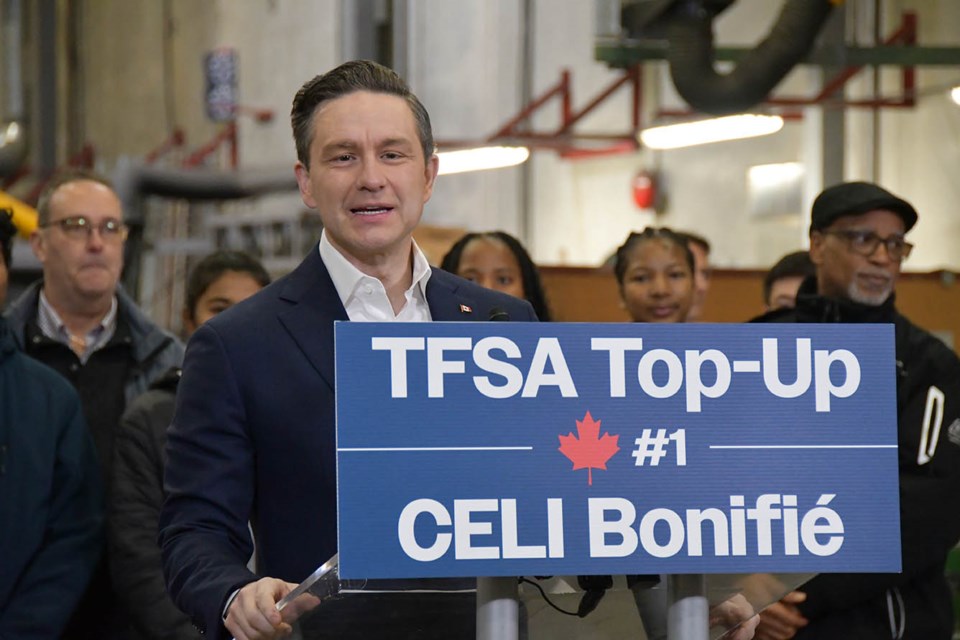Protest groups that flood election ballots with hundreds of paper candidates in an attempt to confuse voters should not be allowed to hijack democracy. That was Opposition Leader Pierre Poilievre’s blunt takeaway after Monday’s byelection—one he won easily, but only after facing down a ridiculous 214-name ballot engineered by activists protesting electoral reform.
“These groups want to confuse people and frustrate democracy, to shut down voices that are speaking common sense,” Poilievre told me Tuesday in an interview for CHEK News (you can check out the full interview here.)
“But you know what? At the end it didn't work, and we're going to change the law to end the long-ballot scam.”
Voters in the Battle River—Crowfoot riding elected Poilievre back to the House of Commons with more than 80 per cent of the vote. But they faced a bewildering number of names, after a group calling itself the Longest Ballot Committee flooded the race with paper candidates to try and protest the current first-past-the-post voting system.
The move was the electoral equivalent of climate protesters gluing themselves to the road at rush hour, a stunt where whatever point they hoped to make was lost in the irritation of ordinary people just trying to get something done.
Voters in Toronto faced it first in 2024 with an 84-name slate that resulted in a paper ballot more than one metre long. This time Elections Canada even resorted to blank mail-in ballots to spare people the paper nightmare.
“There's obviously some very well-organized and well-funded special interest groups that wanted to keep me out of Parliament so that I couldn't question the authority or ask the difficult questions that Canadians want to ask,” said Poilievre.
“But in the end, the people spoke and gave me a strong mandate to fight for affordable life, safe streets, a more self-reliant Canadian economy. They voted for all those things despite the distractions of this long ballot.”
The Longest Ballot group used to be affiliated with the Rhinoceros Party, and has targeted other Conservative MPs in elections, such as Andrew Scheer.
The Conservatives have called on the federal Liberal government to change the election laws to make it tougher to create chaos and confusion on the ballot.
“If every candidate had to have their own signatures sponsoring them … and that if each signatory could only sign once, then that would do away with it, because this group, despite its financing and its central control out of Ottawa, would not be able to get the signatures to have 200 people,” said Poilievre.
Poilievre is pointing to the byelection to push for changes. He’s pitching it as another example of “common sense” versus fringe chaos. It’s hard to argue the chaos isn’t real. Of the 214 candidates, almost 200 had fewer than ten votes, with 74 managing zero. That’s not a protest, that’s a big fat waste of time for voters.
Roughly 47 per cent of people surveyed by Angus Reid last month supported changing the law to ban the practice of flooding ballots with nonsense candidates. But support was lowest amongst people who identified as Liberal or New Democrat voters—perhaps because the long ballot protest is helpful to them by targeting the Conservatives.
Regardless, Poilievre is hopeful the government will amend the law.
As it should.
Protesters demanding electoral reform can’t be allowed to weaponize ballot clutter at the expense of voter trust and turnout. At a time when people already question whether elections matter, anything that makes the process deliberately frustrating is a surefire way to make democracy weaker, not stronger.
Rob Shaw has spent more than 17 years covering B.C. politics, now reporting for CHEK News and writing for The Orca/BIV. He is the co-author of the national bestselling book A Matter of Confidence, host of the weekly podcast Political Capital, and a regular guest on CBC Radio.
🚨New newsletter alert! Stay ahead of the curve in B.C. politics. Get expert political analysis delivered straight to your inbox, plus inside scoops and other stories from across the province. Sign up here for the Capital & Coast newsletter.



